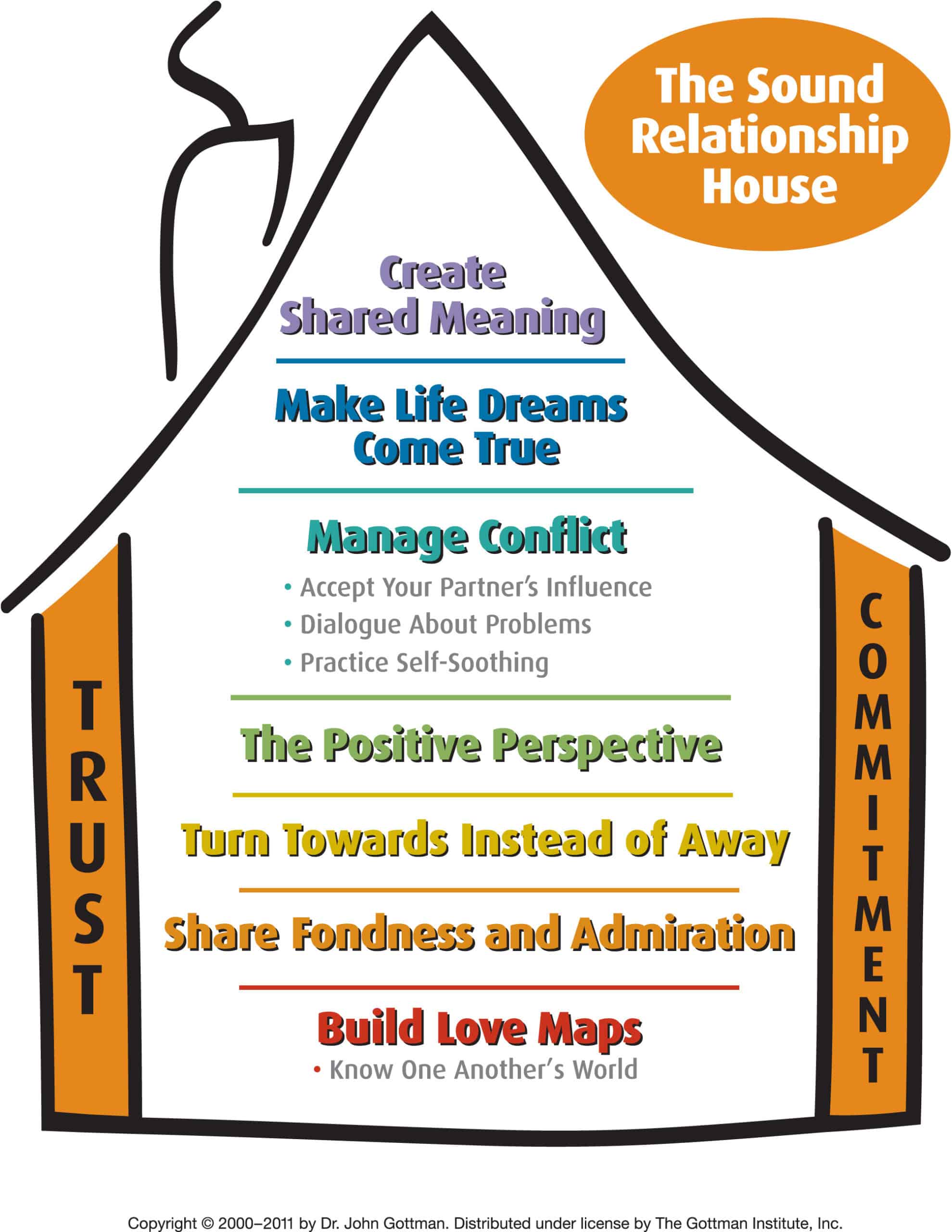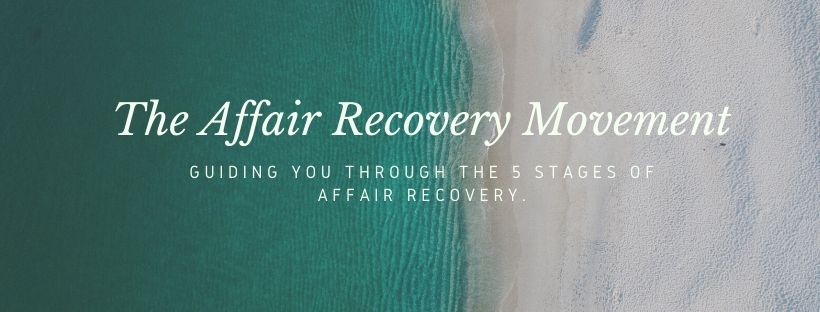While the Gottman Sound Relationship House is not a metaphorical magic wand, it is a concrete tool that couples can use to heal.

By Sarah P.
Drs. Julie and John Gottman, of the Gottman Institute, have dedicated their entire lives to researching what elements create successful, long-term relationships.
I love the Gottman’s for many reasons, but the largest reason their work stands out is because they spend countless hours gathering essential data, versus spending time speculating. The data that they gather is centered on isolating the key factors that make relationships thrive. The key factors they discover can be successfully applied to real-world relationships.
The Gottman’s work has culminated in a concept called the Sound Relationship House.
The Sound Relationship House was developed after the Gottman’s spent thousands of hours in their research facilities interviewing a diverse set of couples.
The Sound Relationship House can be applied to all relationships regardless of one’s culture, religious beliefs, ethnic background, or socio-econo0mic background. In the end, they built a model that applies to all.
How Infidelity Affects the Eight Areas that Lead to Successful Relationships
How Does the Sound Relationship House Model Affect Affair Recovery?
After infidelity has been discovered and if you desire to work on your relationship, the Gottman Sound Relationship House provides you with the building blocks of healthy relationships.
The goal would be to institute these building blocks as best as possible while recovering. However, instituting them can be difficult unless both partners agree.
In many cases, the shock of infidelity appears to affect betrayed spouses the most and for good reason. Meghan O’Rourke, says it best:
The people we most love do become a physical part of us, ingrained in our synapses, in the pathways where memories are created.”
This synthesis of two souls, and the subsequent wrenching apart of the bonds that tie together beloveds, is often experienced as one of the single-most, life-shattering experiences an adult can experience.
When a betrayed spouse attempts to convey their pain to a wayward spouse, words often fail, since this pain is experienced and the words to describe such pain are rare. Infidelity is a pain that is felt and experienced, more than spoken.
Worse, sometimes a wayward spouse can become defensive and even feel attacked when a betrayed spouse wishes to talk about their emotions regarding this deep betrayal.
Regardless of the fact that a wayward spouse caused the problem, the wayward spouse sometimes reaches a point where they no longer desire to listen to the pain of a betrayed spouse.
When a couple talks about creating a Sound Relationship House, some wayward spouses tend to be more open to listening, since this concept provides a couple with the ability to institute a concrete solution.
The Sound Relationship House House in Detail
The Gottman Institute has discovered that couples who function optimally treat each other with thoughtful consideration and support. But, how does this look?
The Sound Relationship House describes how this support structure works and this support structure has seven distinct levels that encapsulate a healthy relationship.
Ellie Lisita describes it best:
“The goals of the Gottman Method include increasing closeness and friendship behaviors, addressing conflict productively, and building a life of shared meaning together. The Gottman Method involves customizing principles from the research to each couple’s particular patterns and challenges.
The Seven Principles include the following concepts:
Build Love Maps: This refers to an ongoing awareness of our partners’ worlds as they move through time: how they think and feel, what day-to-day life is like for them, and their values, hopes, aspirations, and stresses.
Express Fondness and Admiration: Couples who function well are able to appreciate and enjoy most aspects of each partner’s behavior and learn to live with differences.
Turn Toward One Another: Conversational patterns of interest and respect, even about mundane topics are crucial to happiness. Couples who turn toward successfully maintain a 20:1 ratio of expressing interest or acknowledgement vs. ignoring conversational gambits. This is referred to as the “Emotional Bank Account.” Couples who are highly successful keep a 5:1 ratio in conflict discussions, even Turning Towards while arguing.
Accept Influence: Members of a couple who take the other partner’s preferences into account and are willing to compromise and adapt are happiest. Being able to yield and maintain mutual influence, while avoiding power struggles, helps couples keep a balance of power that feels reasonable and builds trust.
Solve Problems That Are Solvable: Couples who can find compromise on issues are using five tactics. They soften start up so the beginning of the conversation leads to a satisfactory end. They offer and respond to repair attempts, or behaviors that maintain the emotional connection and emphasize “we/us” over individual needs. They effectively soothe themselves and their partner. They use compromise and negotiation skills. They are tolerant of one another’s vulnerabilities and ineffective conversational habits, keeping the focus on shared concern for the well-being of the relationship.
Manage Conflict and Overcome Gridlock: The Gottman Method helps couples manage, not resolve, conflict. Conflict is viewed as inherent in relationship and doesn’t go away. Happy couples report the majority of their conflicts, 69% are perpetual in nature, meaning they are present throughout the course of time and are dealt with only as needed. These recurrent themes become part of the couple’s shared landscape and are kept in perspective, not dwelt upon.
Create Shared Meaning: Connection in relationship occurs as each person experiences the multitude of ways in which their partner enriches their life with a shared history and helps them find meaning and make sense of struggles.” (1)
How Can We Use these Concepts to Speak with a Hesitant Wayward Spouse?
The thing that I like best about the Sound Relationship House is that it providers a couple with an opportunity to distant themselves a bit from their current situation and discuss something tangible and universal: what makes a strong shelter or home.
When someone has an affair, the Gottman’s often describe this as “opening a window to another.” In real life, when a person opens a window and there is no screen, unwanted pests enter the house.
So, this analogy transfers well to marriages. When we metaphorically turn away from our spouse and open a window to another, unwanted complications ensue. These unwanted complications often also destroy lives.
Even if a couple experiences infidelity, the Sound Relationship House provides guidelines on what couples can do, to work together, as a team, and to move towards a common good.
In Summary
While the Gottman Sound Relationship House is not a metaphorical magic wand, it is a concrete tool that couples can use to heal.
While I would never suggest that a couple should avoid discussing the negative affects of infidelity, I do believe that there is value in a map that shows couples how to construct a strong marriage.
After all, very few of us have the luxury of seeing real-life examples of what makes a strong marriage, so there is certainly room for a map that assists couples in moving forward after infidelity.
Indeed, when one has nothing to lose because they are starting from ground zero, the Gottman Sound Relationship House has much value to add.
I invite you to show your wayward spouse this article. I believe the Gottman Sound Relationship House could work within the bounds of your marital dynamic. It is my hope that this information provides you with a path forward, which can be forged together, as a couple.
Sources:
https://www.gottman.com/blog/an-introduction-to-the-gottman-method-of-relationship-therapy/
